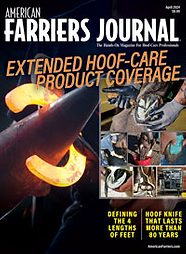The U.S. House of Representatives today approved the U.S. Sen. Joseph D. Tydings Memorial Prevent All Soring Tactics (PAST) Act of 2019 (H.R. 693) in a vote of 333 to 96. It will now move on to the Senate.
The bill aims to amend the Horse Protection Act (HPA), which prohibits sored horses from participating in shows, exhibitions, sales or auctions, by criminalizing soring and prohibiting several items that are used to artificially alter the horses’ gait or conceal evidence of soring. Soring is the intentional application of substances or devices to horses’ limbs to inflict pain in order to achieve an exaggerated high-stepping gait in show rings.
For equine welfare advocates the bill’s passage is an important milestone. A release from the American Horse Council states “Today’s historic vote constitutes one of the most significant legislative wins for equine welfare since passage of the Horse Protection Act in the 1970s.”
For the Walking Horse industry it’s a disappointment.
“It is an attempt not to end the unacceptable act of soring, but rather to eliminate the Walking show Horse industry that provides over 20,000 jobs and has an annual economic impact of $3.2 billion,” says Mike Inman, chief executive officer of the Tennessee Walking Horse National Celebration.
Rep. Ted Yoho and Kurt Schrader, both of whom are veterinarians, are the main co-sponsors of the bill, which would substantially revamp the farriery of Tennessee Walking Horses, Spotted Saddle Horses and racking horses. It would prohibit the use of action devices, “weighted toe, pads, wedge, hoof band, or other device or material at a horse show, horse exhibition, or horse sale or auction that is placed on, inserted in, or attached to any limb of Tennessee Walking Horses, racking horses, Spotted Saddle Horses … to artificially alter the gait of such a horse; and is not strictly protective or therapeutic in nature.”
The legislation defines action device as “any boot, collar, chain, roller, or other devices that encircles or is placed upon the lower extremity of the leg of a horse in such a manner that it can rotate around the leg or slide up and down the leg, so as to cause friction; or strike the hoof, coronet band, fetlock joint, or pastern of the horse.” The legislation does not consider soft rubber or soft leather bell boots or quarter boots that are used to protect the foot as an action device.
The Senate version — SB 1007 — must also be approved before going to the president for his signature.







Post a comment
Report Abusive Comment